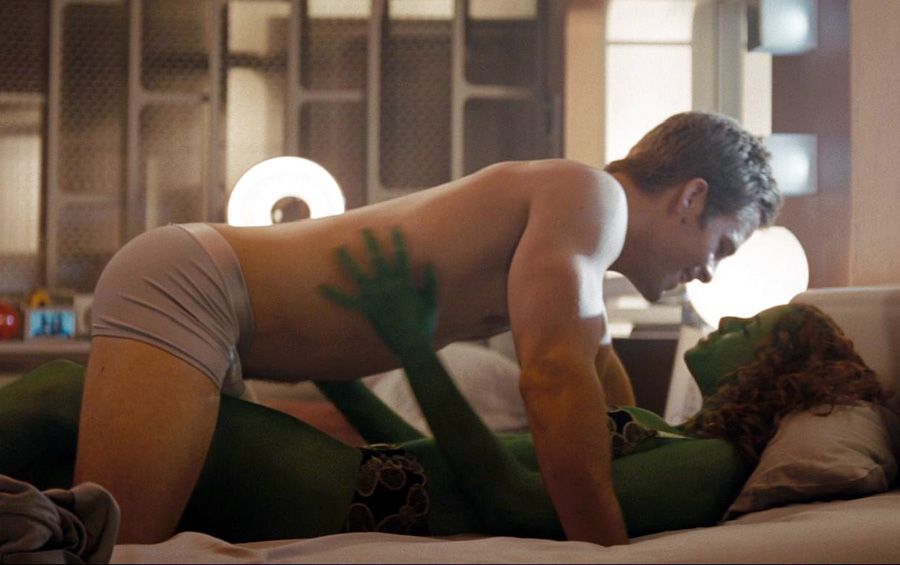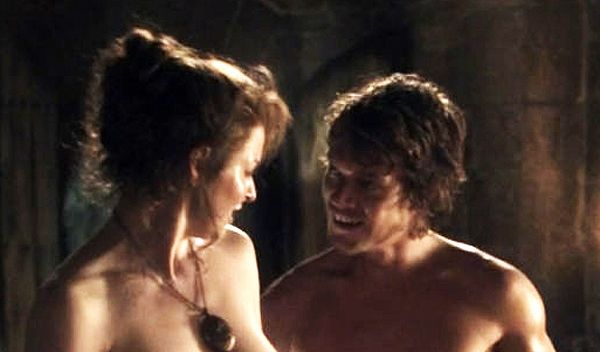I’m not a prude, I just want to get that out there right now.
There are films and television series I love in which the characters strip down on a regular basis. However, there's a lot of nudity out there that leaves me cold and confused. (Probably it leaves the actors involved quite cold as well, but that's another story). You hear much about "gratuitous" nudity on TV dramas like Game of Thrones and Rome, but one person's "gratuity" is another person's "essential character development." Of course, the characters who are most frequently naked on screen are the young, attractive women. Where is the line, then, between storytelling and exploitation?
When Carol Marcus (Alice Eve) strips down to her bra and undies during a boring exposition scene in Star Trek Into Darkness, I wasn't so much offended as baffled. Sure, she needed an activity to keep the scene moving while she explained the history of the mysterious torpedoes to Captain Kirk, but did it have to involve him sneaking a peek of her body? She was apparently "changing clothes" to complete the next part of the mission. In the rest of the film, however, the characters swap out outfits off-screen. Somehow, Marcus is the only one who doesn't get to go back to her quarters to change. A very affable J.J. Abrams appeared on Conan to address the scene, explaining he tried to balance female and male (near-) nudity while acknowledging he may have edited the sequence poorly. He even offered up an "evil shower scene" featuring Benedict Cumberbatc that, although fun, didn't belong in the movie either. It tells us nothing about Cumberbatch's character, other than the size of his abs and his hatred of running water.
Weirdly, there was a far longer bra-and-undies sequence in 2009’s Star Trek that I didn't mind as much. Kirk is hooking up with Gaia, Uhura's roommate at Starfleet Academy, when Uhura comes home and begins to change clothes. She figures out that Kirk is hiding under the bed and flips out. That scene, while filled with characters in a state of undress, gives us insight into Kirk (he's the kind of guy who knows nothing about the girls he hooks up with) and Uhura (she’s that roommate who throws a fit when her roomie brings a guy home). It's also worth noting that all this takes place during off-duty hours. Part of the appeal of highly structured science fiction universes (like Star Trek and Battlestar Galactica) is that everyone has to work together, no matter what they were doing the night before. When characters do hook up (or have sexual tension), it can add complexity to tense situations on the bridge. If a nude scene doesn't add to character or plot, then it might as well be a Victoria's Secret ad.
Perhaps no show in the history of television is more eager to get everyone naked than Game of Thrones. Oddly enough, many of the nude scenes from George R.R. Martin’s novels are missing. When we meet Catelyn Stark in the first book, she's nude in bed with her husband. When Bran discovers Cersei and Jamie Lannister doing their whole twincest thing, they're naked in the book, but not in the TV scene. Instead, Ros gets naked with Theon Greyjoy, and later with Tyrion Lannister -- both scenes that don't exist in the original book. What's going on here?
In the books, sex and nudity are complicated. Sometimes, being undressed means a character is powerless, as when Sansa has her clothing ripped off before the Iron Throne. Sometimes, characters are able to use their bodies to ensure power: Danaerys frequently describes wearing specific revealing outfits to fit in with new cultures or seduce men from other lands. Either way, it's rare that Martin writes a truly sexy sex scene. There's a lot of assault, and even Tyrion's encounters with prostitutes are measured by descriptions of his horribly brutalized face. No one in Westeros gets soft lighting and smooth jazz.
That's the difficulty with film. Although we're obsessed with sex and nudity, it's rare we see a body on screen that looks flawed, or a sex scene that isn't intended to titillate. In novels, we can hear a character's internal monologue as he or she expresses doubt, anxiety, or shame. All those emotions are a part of sex -- but they aren't terribly sexy to think about. If directors and producers can evolve past the need to excite their audiences, and work on telling real stories about human relationships, then perhaps we'll all get to watch some less exploitative entertainment.



